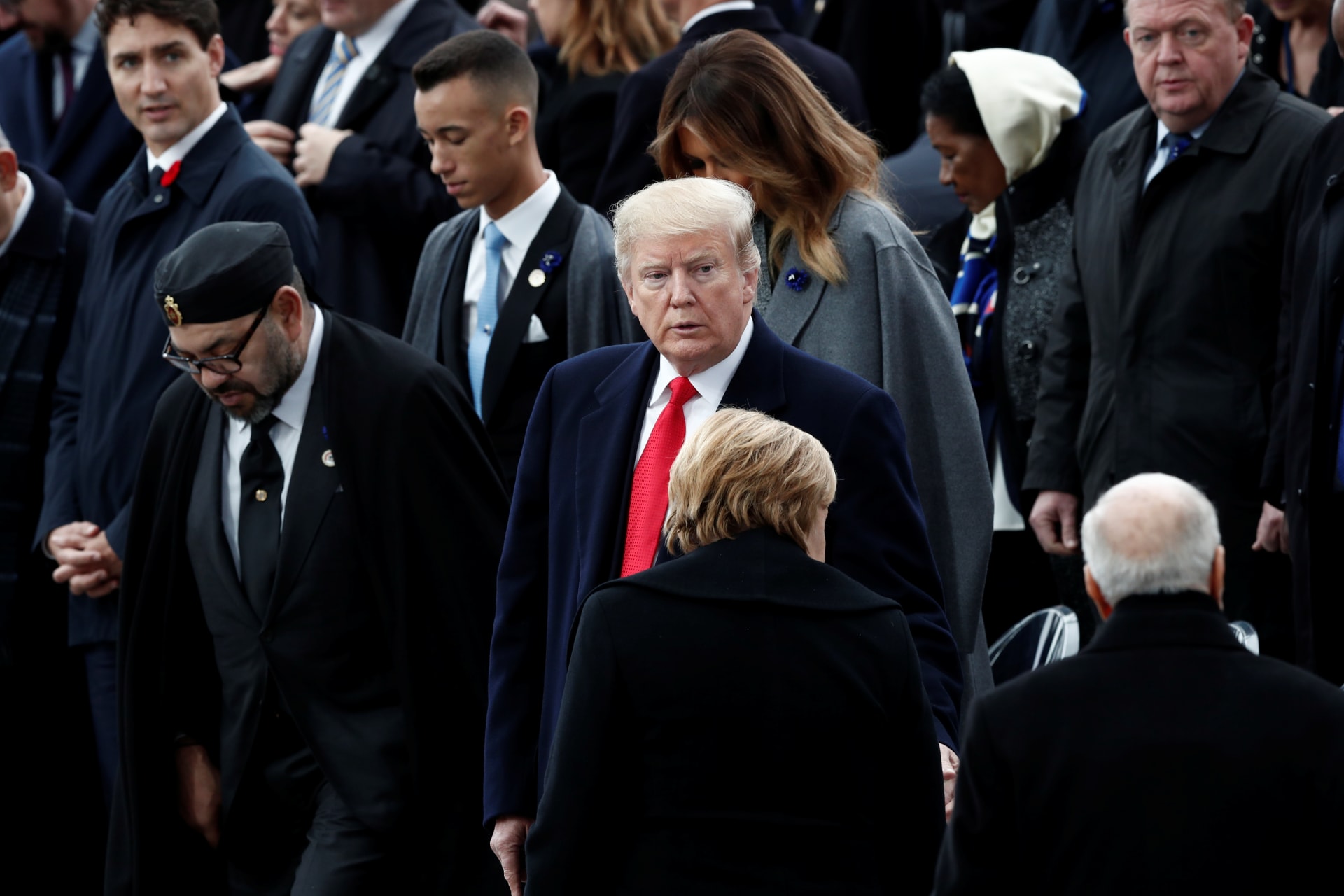Spare Us the Nationalist Defense of American Sovereignty
The idea that current trends in multilateral cooperation threaten American sovereignty is a red herring. The fundamental reality of modern international life is that global challenges require multilateral cooperation, and the decision to enter into a multilateral arrangement is not an infringement of sovereignty but its expression and embodiment.

By experts and staff
- Published
By
- Stewart M. PatrickJames H. Binger Senior Fellow in Global Governance and Director of the International Institutions and Global Governance Program
It is past time to challenge conservative nationalists on their fearmongering about alleged threats to American sovereignty. A case in point is Wednesday’s Washington Post column by Marc A. Thiessen (“The French President and the Alt-Right Both Get Nationalism Wrong”). The column is robustly argued—and deeply misleading. Thiessen depicts U.S. liberals, cartoonishly, as indifferent to national sovereignty. He ignores the actual costs to the nation of Donald J. Trump’s “America First” policies. And he sidesteps the president’s embrace of the very blood-and-soil nationalism that Thiessen himself criticizes.
The objects of Thiessen’s scorn are “globalists” like French President Emmanuel Macron and his “liberal” fellow travelers in the United States. He castigates progressive Americans, whom he says are all too willing to subordinate popular democracy to the whims of “unelected bureaucrats presiding over unaccountable institutions.” By contrast, Thiessen lauds conservative nationalists, “who refuse to cede American sovereignty to supranational institutions.” The implication is clear: Without conservatives manning the parapet, liberals would be tearing down the walls of U.S. national sovereignty.
Thiessen’s argument rests on a straw man. In reality, there is no global march toward supranationalism, and little appetite for it among American progressives.
To be sure, the world is becoming more institutionalized. New multilateral frameworks of cooperation are being created to help manage global problems from financial instability to nuclear proliferation. But the vast majority of these cooperative arrangements are inter-governmental initiatives among fully sovereign states that have chosen to enter multilateral organizations, ratify international treaties, or join informal coalitions to get a better handle on globalization. Crucially, these are horizontal relationships among independent nations, not hierarchical arrangements that subordinate national political authorities to some global entity.
It is true that European Union (EU) member states have accepted some degree of supranationalism. But the United States remains a very different animal. It jealously guards it sovereign prerogatives, protecting its Constitution as the repository of popular sovereignty and the supreme source of political authority. And when proposed international bodies (like the International Criminal Court) promise to infringe on national sovereignty, they have elicited skepticism from Democrats as well as Republicans.
In sum, the idea that current trends in multilateral cooperation threaten the American people’s sovereignty is a red herring.
Nevertheless, it remains a staple of conservative rhetoric, a canard frequently invoked to frighten Americans into believing that the United States is on the slippery slope to some global version of the EU—and eventually a world state. And one can see why. Implying that U.S. “sovereignty” is in jeopardy is a good way to mobilize American populists against multilateral initiatives like the United Nations and the UN Convention on the Law of the Sea.
It is akin to implying that motherhood and apple pie are under attack and is an effective way to distract the public from a more sober assessment of America’s stakes in a predictable, rule-governed world—and of the costs and benefits of particular institutions.
No surprise, then, that President Trump trotted out this bogeyman in June 2017, when he denounced the Paris Climate Agreement—based on independently determined national contributions—as an infringement on U.S. sovereignty.
Contrary to what Thiessen implies, the vast majority of liberal internationalists want nothing to do with a world state. A global government would be an abomination. It would ignore international pluralism and the presence of distinct national cultures and traditions. And it might well devolve into despotism and tyranny.
Rather than a world government, progressives seek a better functioning multilateral system founded in independent republics. They want a United States that commits itself to shaping and leading this world, rather than abdicating its responsibilities and retreating into isolation, as Donald Trump has done.
What of Thiessen’s second objection to “globalism”—that it would see “America tied down with thousands of Lilliputian threads spun out of treaties and institutions that constrain her freedom of action”?
This is another time-honored conservative bogeyman. What it ignores is the fundamental reality of modern international life. Few of the most pressing global dilemmas confronting the United States today are amenable to unilateral or bilateral approaches. Securing cyberspace, enforcing trade rules, preserving biodiversity, arresting global warming, eradicating disease, combating terrorism, and so many more problems require multilateral cooperation. And that cooperation depends on a willingness on the part of all parties to voluntarily forego certain options and to accept certain common obligations.
In a global age, the decision by the United States to enter into a multilateral arrangement—provided it is done by constitutional means—is not an infringement or an abdication of sovereignty but indeed its expression and embodiment. This does not mean all multilateral initiatives warrant U.S. support. But it implies that such decisions should be taken on their merits, following a cost-benefit analysis of their impact on national interests, rather than groundless objections about national sovereignty.
Thiessen’s final error is in critiquing the alt-right’s blood-and-soil nationalism with nary a reference to the multiple dog-whistles that President Trump has blared at the white nationalists who make up a vocal minority of his constituents.
This is a glaring omission. No person in modern American political life has done more than Donald Trump to reinforce the basest tribal instincts of the electorate, from his reaction to Charlottesville to his tarring of undocumented Mexicans as “rapists,” to name just two episodes.
This is a far cry from the more high-minded conception of the American nation that Thiessen celebrates—and which liberals no less than conservatives have long defended: “a creedal nationalism built on an idea—the idea of human freedom.”